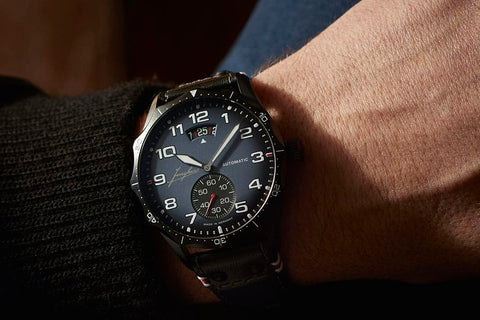When you think of Junghans, I’d bet the first thing that pops into your head is not the Meister Pilot Chronoscope line. This watch is so unlike the brand’s regular Bauhaus-informed fare, it almost feels like it’s from another maker entirely. Perhaps unsurprisingly, that’s exactly why it’s cool.
I can still remember the first time I saw the Junghans Meister Pilot Chronoscope watch. At the time, I was rapt by a multi-sided or scalloped bezel phase and so I was immediately intrigued by the undulating ring of metal surrounding the dial.
The name of the dial said “Junghans”. I was sure there must have been some mistake. I checked my watch to see if it was April Fool’s Day. No, it was the middle of October. What was happening? How could this jagged wrist beast possibly be a Junghans? A crisp, clean, butter-wouldn’t-melt-in-its-mouth Junghans?
The Junghans’ designs I’d encountered in the past were the safest of the safe, but this guy… This guy was different. He may have had the same brand name on his face, but he was one bund strap and a sleeveless denim jacket away from joining the Hell’s Angels… He was tough. And it drew me in…
The Low-Down
Junghans was founded in 1861 by Erhard Junghans and his brother-in-law. Initially, the brand sold components to Black Forest clock makers, but the company was soon producing its own clocks. By the time 1903 ticked around, Junghans was the largest timepiece producer in the world (at that point, the company was 3,000 people strong and producing around 3,000,000 timepieces annually).
The Second World War caused much disruption for the company, which was forced to produce, among other things, munitions for the Axis forces as well as the brand’s factory being used as a temporary POW camp towards the end of hostilities.
Watch production began again in 1946 and by the mid-fifties, the company won the bid to provide the newly formed German Bundeswehr with pilot’s chronographs (very similar in style to the Meister Chronoscope chronographs of today). This was not, however, the brand’s first foray into aviation, having made dashboard instruments for planes such as the Messerschmidt Me 110 as early as the 1930s.
Soon after, the legendary director of the Dessau-based Bauhaus School of Design Max Bill first designed the truly iconic teardrop-shaped kitchen clock for the brand in 1956 and would continue to work with Junghans throughout the sixties. The success of his input reshaped the brand and somewhat overshadowed the popular military chronograph, which explains why they still seem so jarring to the eye today.
Now, the brand presents three new Meister Pilot Chronoscope watches, two with the compur (a twin sub-dial layout) and one time and date model utilizing a sub-seconds dial and an unusual three-date window between 12 and center. The two compur chronographs come in two colorways: either “navy” blue with red accents (reference 27/3396.00 limited to 300 pieces worldwide) or “desert” (reference 27/3398.00) with a brown/black DLC-coated case. Both these models, as well as the time and date Meister Pilot Automatic (reference 27/4397.00), have a 43.3mm diameter, but both chronographs are 14.4mm thick in comparison to the automatic’s relatively humble 12.5mm height on the wrist.
Ticking within the Chronoscope chronographs is caliber J880.4, which shows the going seconds at 3 o’clock and the elapsed minutes at 9, all the way up to 30. The automatic time and date model is driven by caliber J880.1.6. All three watches have meager 38-hour power reserves and a solid 100-meter water resistance.
IMHO
The colors employed here are both modern and sensible in terms of legibility. For me, however, the best thing about these Junghans Meister Pilot Chronoscope watches is the interaction between the domed sapphire crystals and the domed dials.
Domed dials are a personal favorite of mine, to begin with, but to see one on a German pilot’s watch is quite rare. We tend to associate German “Fliegers” (as they are known) as being the starkest of the stark. That typically Teutonic design code is never clearer than on a classic Type-A or Type-B Flieger dial layout. In comparison, these Junghans watches looked positively goofy!
Honestly, I think that’s exactly what stood out to me as odd the first time I saw one. Firstly, this was a brand that I, due to my age (born in the 1980s) and the fact that Junghans’ past had been largely forgotten or overwritten by the success it experienced in the latter half of the 20th century, had never seen anything from the brand that wasn’t Max Bill designed or inspired. His approach to Bauhaus was almost spiritual. He was the leader of a design movement whose firmest proponents could pass for cultists (if very stylish ones). To me, Bauhaus watches were Junghans and Junghans was Bauhaus. These funky, functional, but oddly flair-filled pilot’s watches just didn’t seem to fit the mold.
But maybe that’s the point. Maybe they don’t have to at all. Maybe that’s exactly what makes them cool, and if they do happen to sit on the fringes of a brand’s catalog, perhaps they do so for a reason. Perhaps they exist as a reminder of a time gone by — a reminder of a long, varied, and glorious past that once saw this too-often-overlooked German marque renowned the world over as the biggest brand of them all.












